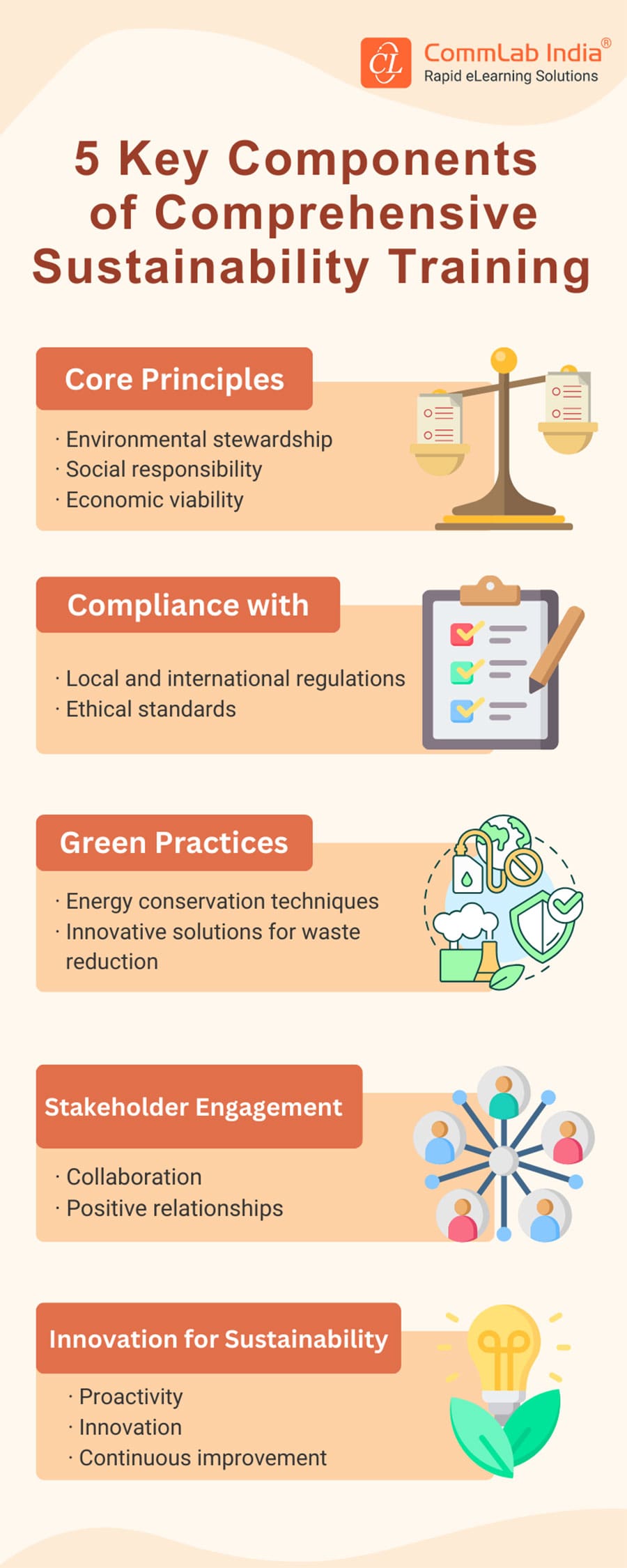What are the Key Components of Sustainability Training? [Infographic]
![What are the Key Components of Sustainability Training? [Infographic] What are the Key Components of Sustainability Training? [Infographic]](https://blog.commlabindia.com/hubfs/blogs/sustainability-training-key-components-info.jpg)
SUSTAINABILITY.
According to the United Nations Brundtland Commission, sustainability refers to the ability to meet the needs of the present without compromising the ability of future generations to meet their own needs. It's about finding ways to live that are both environmentally sound and socially responsible. However, with increasing advancement, innovation, and changing lifestyles, it is turning out to be a complex issue. The need for sustainability is garnering attention as we face challenges like climate change and resource depletion. Corporate sustainability is becoming an increasingly important consideration across all industries, as businesses and organizations strive to minimize their environmental impact and foster a more socially responsible approach to operations.
But, achieving sustainability goals requires more than just implementing eco-friendly practices. It demands a cultural shift within organizations and necessitates comprehensive sustainability training. Sustainability training plays a vital role in fostering this shift by educating employees about the principles of sustainability and empowering them to integrate these principles into their daily work routines. So without much delay, let’s dive into understanding the pillars of sustainability, the importance of comprehensive sustainability training, and its key components.
3 Main Pillars of Sustainability
- Environmental sustainability: It refers to the use of resources in a way that doesn't deplete them or harm the environment. It includes things like reducing pollution, conserving water, and using renewable energy sources.
- Social sustainability: It focuses on the creation of a just and equitable society where everyone has the opportunity to thrive. Social sustainability covers topics like reducing poverty, improving quality of education, promoting human rights, etc.
- Economic sustainability: It emphasizes the need of maintaining a strong and stable economy that can meet the needs of the present and future generations. It incorporates a variety of topics ranging from investing in renewable energy to developing sustainable businesses and creating green jobs.
→ Download Now: Instructional Design Strategies to Design Engaging eLearning Courses
Why Should Organizations Focus on Sustainable Training?
Answering why organizations should focus on comprehensive sustainable training can be a little tricky because there are so many reasons! But to keep it simple, sustainability training for employees is not just about mere compliance or ticking boxes. Rather, it's about fostering a mindset that prioritizes responsible practices and long-term thinking.
By providing comprehensive sustainability training, organizations can:
Increase Awareness
Here’s a little inside secret for you: Many employees don’t even fully understand the importance of sustainability or how their actions impact the environment and society. Yes, it’s true. Conducting training programs on sustainability is a good opportunity to raise awareness about key sustainability issues and guide employees to take proactive steps toward positive, sustainable change.
Drive Engagement and Action
If you still haven’t tapped into the potential of “What’s in it for me”, then here’s your chance. At times, employees are aware about the concept of sustainability, dos and don’ts, etc., but aren’t really motivated to take action. Or more so, some of them might want to but don’t know how or where to start. Comprehensive sustainability training is a great way to offer that much-needed push toward a positive change.
Effective training engages employees to embrace sustainability initiatives, take action, and actively contribute to the success of sustainability training programs. When employees are involved in sustainability training, they experience a sense of ownership and commitment toward environmental and social goals, thereby facilitating a positive change.
Enhance Skills
Simply knowing the best practices for sustainability doesn’t really contribute to successful sustainability training programs. Learning to integrate sustainable practices into their daily work routine is the key! Therefore, employees should be equipped with both, knowledge and skills, to ensure effective sustainability initiatives.
Comprehensive sustainability training can contribute significantly as you provide learners with different scenarios, simulations, interactivities, quizzes, etc., that promote critical thinking and decision-making. You can cover topics such as energy efficiency, waste reduction, sustainable sourcing, and more.
Foster Sustainable Innovation
“A journey of thousand miles starts with a single step.”
Comprehensive sustainable training can be that step for employees. Through sustainability training programs, they can understand the importance of sustainable living and work toward finding creative and innovative solutions to tackle the challenges.
Build a Sustainable Culture
Ultimately, comprehensive sustainability training helps build a culture that values sustainability as a core principle. When sustainability becomes ingrained in an organization's culture, it influences decision-making at all levels and drives lasting change.
5 Key Components of Comprehensive Sustainability Training
Parting Thoughts!
Sustainability training is a vital investment for organizations committed to making a positive impact on the environment and society. When you provide employees with the knowledge, skills, and mindset needed to embrace sustainability, you can drive meaningful change and create a more sustainable future for generations to come. The success of your sustainability training depends heavily on the quality and impact of your training courses. To help you design and deliver engaging, relevant, and learner-centric training courses, we’ve got just the right resource for you. Check out our free eBook on instructional design strategies below!






![Key Steps to Developing an Impactful Sustainability Training [Video]](https://blog.commlabindia.com/hubfs/blogs/sustainability-training-impactful-steps-video.jpg)
